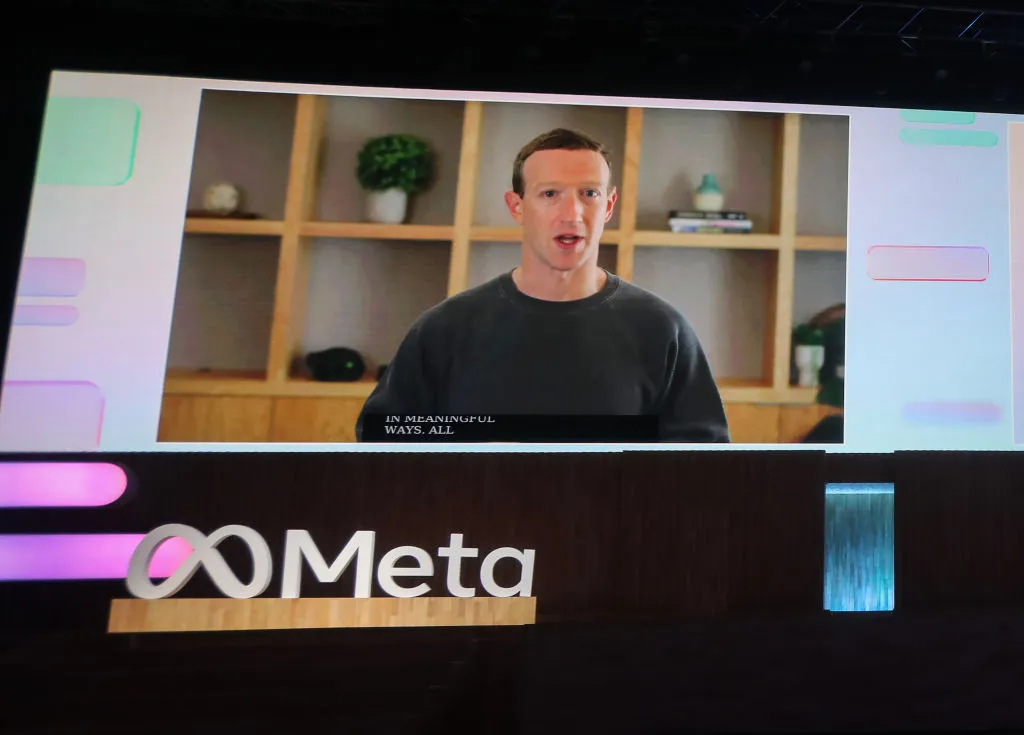Meta Stock Sinks to $418, Zuckerberg’s AI investment “Could Take Years” To Generate Returns

Meta delivered strong Q1 results but the stock price fell after it announced disappointing investment news. l Source: Niharika Kulkarni/NurPhoto via Getty Images
Key Takeaways
- Meta had a strong first quarter of 2024, exceeding expectations for revenue and profit.
- However, the stock fell 15% after-hours, possibly linked to concerns about Meta’s increased investment in AI.
- Meta believes its AI advancements will ultimately increase user engagement and more valuable advertising opportunities.
Meta Platforms has hailed its higher-than-anticipated earnings as it intensifies its investment in artificial intelligence (AI) following yet another exceptional quarter. Revenue and profits surged by double-digit percentages during the initial quarter of 2024.
However, despite surpassing expectations, Meta’s stock experienced a significant 15% decline – bringing the value of the share to $418.85 – after the New York market close, possibly influenced by the AI investment announcement and its projected long-term returns.
Results Beat Estimates But Stock Dropped
After closing at $493.50 in New York on Wednesday, Meta shares experienced a further 15% tumble in after-hours trading. It has dropped by an additional 15% in Thursday’s pre-market trading.
But the tech giant, encompassing Facebook, WhatsApp and Instagram, previously delivered impressive financial results for the first quarter of 2024. Revenue soared by 27% to $36.46 billion from the previous year’s $28.65 billion, while net income more than doubled to $12.37 billion from $5.71 billion. Diluted earnings per share climbing to $4.71 from $2.20.
Meta reported that its family daily active people averaged 3.24 billion for March, marking a 7% increase from the previous year. Ad impressions across its Family of Apps surged by 20% year-over-year, accompanied by a 6% rise in the average price per advert.
Despite these gains, total costs and expenses for the quarter rose by 6% to $22.64 billion. Looking forward, Meta anticipates second-quarter revenue to fall from $36.5 to $39 billion.
Meta’s Investments In AI Disappoints Investors
For the second quarter, the powerhouse behind Facebook and Instagram projects revenues ranging from $36.5 to $39 billion, slightly below analysts’ average expectations . Notably, following a year of focused cost containment in 2023, the company has again intensified its investments, positioning itself as a key player in the ongoing artificial intelligence race.
Antonio Ernesto Di Giacomo, market analyst at xs.com , told CCN: “This performance can be attributed to several factors. On one hand, Meta’s total revenues increased significantly, with an impressive year-over-year growth of 27%. To support this growth was a 6% increase in costs and expenses, indicating efficient financial management by the company. Meta particularly highlighted the strong momentum experienced by its core applications and significant advances in critical areas such as artificial intelligence.”
AI is already integrated into Meta’s products, enhancing functionalities such as more precise targeting of digital ads. Recent announcements, like the unveiling of the new Llama 3 large language model, underscore Meta’s commitment to AI innovation. Mark Zuckerberg has affirmed that once their AI services achieve significant scale, the company has a proven track record of effectively monetizing them.
Meta has set a target of up to $10 billion in capital expenditures for artificial intelligence in 2024. The revised projection now stands between $35 and $40 billion, compared to the previously indicated range of $30-37 billion. Moreover, expenditures are expected to increase further in 2025, focusing on advancing computer systems and chip technologies.
But AI Outcome Satisfies Management
The first quarter report shed light on the ongoing hurdles faced by Meta’s Reality Labs division, dedicated to the virtual and augmented reality metaverse. The division marked a 29% increase in revenue, reaching $440 million. However, it continued to record an operating loss of $3.8 billion in the January to March period.
Meta’s CEO, Mark Zuckerberg, acknowledged the historical stock volatility during phases of heavy investment in scaling and new products, before monetization. He drew parallels with the early days of Reels, which now constitutes approximately half of users’ time spent on Instagram. Zuckerberg emphasized the necessity of increased AI investment to maintain Meta’s leadership position.
About 30% of Facebook feed posts are now delivered by its AI recommendation system, doubling over the past few years. Additionally, for the first time, over 50% of Instagram content is AI-recommended, as Zuckerberg revealed. The AI recommendation system drives engagement, enhancing the platform’s advertising potential and value proposition to advertisers.
Zuckerberg updated on Meta’s new AI assistant, noting positive initial feedback from users. MetaAI, powered by the latest Llama 3 AI model, debuted a week before earnings release. This AI assistant, integrated across Facebook, Instagram, and WhatsApp, positions Meta to compete more effectively with Microsoft-backed OpenAI‘s ChatGPT and Alphabet’s Google Gemini chatbot.
The company remarked that the initial rollout of MetaAI has been successful, with tens of millions of users already trying it, highlighting the demand for expanded regional availability. MetaAI, with Llama 3, “is now the most intelligent AI assistant available for widespread use” for Zuckerberg.


